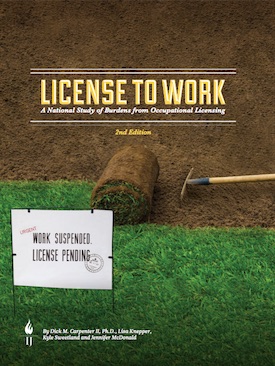The Institute for Justice has published a new edition of its landmark License to Work study of occupational licensing of 102 lower-income jobs.
 Here’s what the new study found for North Carolina:
Here’s what the new study found for North Carolina:
North Carolina’s licensing laws for lower-income occupations are the 41st most burdensome in the nation. They require, on average, $199 in fees, 234 days of education and experience, and around one exam. Because North Carolina licenses more of the lower-income occupations studied here than most other states—67 of 102—it ranks as the nation’s 17th most broadly and onerously licensed state.
North Carolina licenses several occupations that are unlicensed elsewhere, such as opticians and sign language interpreters, who are both licensed by just 21 other states. Despite infrequent licensure in other states, both occupations are fairly onerously licensed in North Carolina. Opticians must demonstrate about 912 days of education and experience (comprising two years of education and six months of experience) before becoming licensed—much more than the average of 714 days across licensed states. And sign language interpreters face $938 in fees and 1,469 days (four years and 40 hours) of education in North Carolina— considerably higher than the licensed-state averages of $661 in fees and 1,088 days of education and experience.
North Carolina also licenses some occupations much more onerously than it does others that may have a stronger connection to public safety. For example, North Carolina has one of the most burdensome barbering licenses in the nation, requiring $270 in fees, 722 days lost to education and experience (comprising 1,528 hours of schooling and one year of experience), and three exams. But EMTs need just 43 days (166 hours of education and 24 hours of experience) and two exams to become licensed. North Carolina should consider whether its heavy licensing burdens for barbers and other occupations can be reduced, repealed or—if government regulation is necessary—replaced with less restrictive regulatory alternatives such as inspections or voluntary certification.


